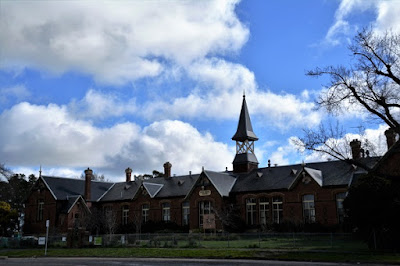Clunes is all
about books. The annual Clunes Booktown Festival is proof of that, when, in April-May,
over 50 visiting book traders from around Australia join forces with the town’s
seven permanent bookstores to present what many have called “an unequalled
weekend of book browsing.”
That’s when
thousands of secondhand, collectible, small press and out-of-print books go on
sale; and people can attend workshops and author talks. It’s a book bonanza and
anyone who loves books finds their own little piece of rural Victorian Heaven.
There are
around 22 international members of the
International Organisation of Booktowns
( www.booktown.net) and Clunes is the first in Australia
and one of only two in the Southern Hemisphere (at time of writing). [The other
is Featherston, New Zealand]. During the Booktown Festival, the town’s main
street is closed to traffic and the usual population of around 1,700 swells to
an impressive 18,000 or more.
Booktowns are a
European concept and by definition, a booktown is “a small rural town or
village with a concentration of secondhand and antiquarian bookshops.” Clunes
became a member of the international organisation in 2012.
All this is what
drew me to Clunes. I’m a book lover and I’d heard a lot of positive things
about the little town, which owes its existence to the Victorian goldrush. It’s an historic gold mining town, located in the
heart of Victoria's Central Goldfields region, just north of Ballarat and about
an hour and 20 minutes’ drive west of Melbourne CBD.
I arrived ‘by
the back door’ – a short cut from Blampiad that wound through a fascinating
rolling, agricultural landscape peppered with startling green cones (old
extinct volcanoes) dotting the horizon, and the relics of old mining buildings
and dredging piles.
And suddenly,
there I was, driving passed a bedraggled array of houses on the outskirts of
town on a day that what was clearly close to inorganic rubbish collection day –
big heaps of domestic dross piled at gateways waiting for collection. It wasn’t
a tantalizing beginning.
But the Clunes
State School 1552 was. Its impressive form dominated the end of Canterbury
Street (where it met Paddock Street – which for no reason at all, amused me
immensely). I was just beginning to think ‘this was it’ when I rounded a corner
and came face-to-face with the quaintest little streetscape I’d seen in
ages….well….since Maldon at least.
·
·
There’s a ‘Wild
West’ element to it all and it wasn’t surprising at all to learn that, like
Maldon, Clunes is sought-after by film-makers as a location. In Clunes’ case
there have been many but when Mel Gibson and his team arrived in town to film
“Mad Max,” [1979], they set off a chain of events that continues today – in much the
same way as “Lord of the Rings” fans descend upon the New Zealand movie sets, “Mad
Max” fans arrive in Clunes on their motorbikes, park outside the pub and sit
down for a beer and a yarn about the movie.
“When the War
Began, “Doctor Blake,” “Ned Kelly,” “On The Beach,” “Halifax f.p and the recent
remake of “Picnic at Hanging Rock” were all also filmed in part or their
entirety at Clunes.
Many of the original
old gold rush buildings are still standing and ‘in good working order’ and
although it was quiet when I arrived at 10am, I could see why it was becoming
increasingly popular. I liked its unhurried air, its sense of rural comraderie,
evidenced in friendly smiles and happy hellos. As corny as that sounds, it’s a
noticeable thing in small town Australia that I really enjoy. People are happy to stop for chat, even when they don't know you.
Even as the day
wore on, and locals and visitors fell upon the cafes like thirsty camels in a
desert, the locals were still stopping in the street to chat – and when I say
“stopping in the street,” I mean it literally. No one seemed at all bothered
about the fact that roads were actually designed for cars
While I began
this little tale by saying ‘Clunes is all about books,’ it is also without a
doubt, about the people and the architecture. With every small Victorian town I
visit, I am surprised all over again by the wealth of well-preserved old buildings,
their scale and their presence in sometimes very small communities. And the
revival of small-town Australia is flourishing. For Clunes, it’s been on the
back of film sets, its Booktown Festival and to a degree, the decision by
Wesley College, Australia's largest co-educational
private school, to establish a campus for Year 9 students in the town.
Opened
in 2000, about 80 students take up residency in the Wesley Clunes Residential
Learning Village in the centre of town and become part of the local community
for an eight-week period each term, where they learn how to take care of
themselves in preparation for an independent adulthood. I couldn’t think of a
better place to do that.
www.clunesbooktown.com.au
www.clunesbooktown.com.au












No comments:
Post a Comment